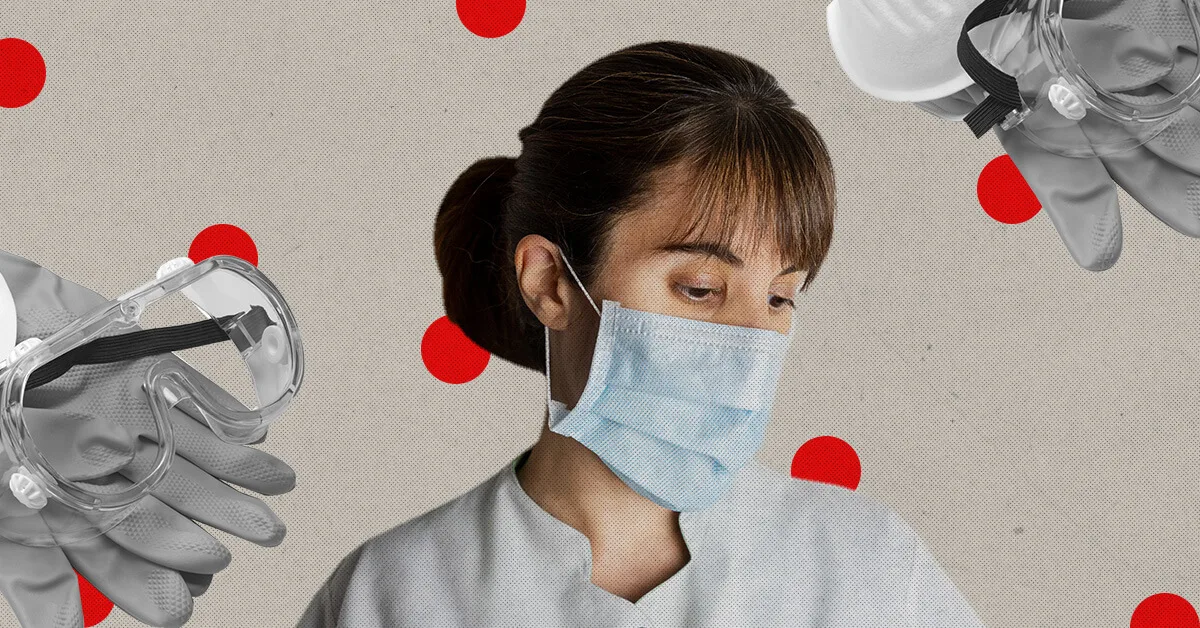
Graphic via Tania Lili for Keystone
For International Nurse’s Day, we highlight three Pennsylvania nurses who are committed to their work despite the risks posed by the novel coronavirus.
For Jaclyn Neilly, a registered nurse in labor and delivery at West Penn Hospital in Pittsburgh, the coronavirus crisis has completely overturned everything she knew to be true about her profession.
“I think what will truly stick with me is the complete uncertainty of this pandemic,” she said. “Health care is all about evidence-based practice implementation through extensive research. Unfortunately, we just don’t have the research available on this virus, which causes us to have to implement ever-changing practices.”
Historically, nurses bring compassionate and competent care to all manner of disasters. During the ongoing pandemic, they’re being challenged to provide care while also putting themselves at increased risk—especially since necessary resources like personal protective equipment (PPE) are in short supply.
At least 79 nurses in the U.S. have lost their lives to COVID, according to data tracked by the American Nurses Association. In a letter addressed to House Speaker Nancy Pelosi earlier this month, nurses across the country demanded safer working conditions. Since January, nurses have been in short supply of PPE, and over four months later, still do not have adequate protection while working. “Many deaths would have been prevented if our government had prioritized the health and safety of healthcare workers,” the nurses’s union wrote. “Instead, our government has treated us as if we are expendable.”
RELATED: Nurses Feel Conflicted About Their Jobs As Supply Shortages Put Their Lives At Risk
According to the Centers for Disease Control and Prevention, the current data indicates healthcare workers account for 11% of all U.S. coronavirus cases. Official reports state more than two dozen healthcare workers have died from COVID-19, but the actual death toll is believed to be much higher. In Pennsylvania, approximately 3,790 healthcare workers have tested positive for the virus.
To date, Pennsylvania has seen more than 57,000 positive cases of COVID-19 and 3,731 deaths. Nurses throughout the state have been forced to adapt to new information and policies on a whim while assessing how this virus affects them personally.
“During the onset of COVID, cases for my job were limited and I wasn’t working at all,” said Alexandra Leeper, a pediatric home health nurse in the Greater Pittsburgh Area. With many parents now at home with their children, that means fewer opportunities to provide one-on-one care to children with special needs.
In March, she was in the middle of her final semester of graduate school, where she’s been pursuing a Master’s of Science in Nursing to become a family nurse practitioner. Leeper, who describes herself as a “caretaker type,” said a desire to work with children and being the oldest of five children is what led her to nursing. “As a nurse, there are always job opportunities, but right now so many are being laid off,” she explained. “I’ll never forget the feeling of uncertainty of finishing my degree during a pandemic.”
Miki Cunningham, a registered nurse working in case management at Sharon Regional Medical Center in rural Mercer County, admits she initially protested the idea of becoming a nurse because she didn’t want to be like everyone else in her family—but they inspired her to anyway. “I wanted my own path, but as it turns out, that path led me back to nursing.”

Though Cunningham works in a county that hasn’t been overwhelmed with COVID cases, she has seen firsthand how drastically a COVID patient can decline even under hospital care. She describes the moment the reality of the pandemic hit her, and it involved her husband, who is an RN at the same hospital where she works.
“Seeing my husband in his isolation gear that he has to wear to care for COVID patients—it’s basically a spacesuit,” Cunningham said. “That image hit me hard the first time I saw it.”
In labor and delivery, Neilly hasn’t yet had to work with COVID-positive mothers-to-be, but she feels confident in the preparedness of hospital staff. “We have been trained on the proper PPE techniques, we have to wear a regular surgical mask from the moment we enter the hospital until the moment we leave, and we’ve limited visitors to one support person,” she said. “This means no swapping of visitors from the waiting room, no doulas—nothing.”
With the government choosing to slowly reopen economies by state, both Leeper and Cunningham believe COVID cases will spike again. On Friday, May 15, 37 counties in Pennsylvania will be moved to the yellow phase of Gov. Wolf’s color-coded reopening plan.
“I think a lot of people feel that means they can go back to doing whatever they want and stop practicing social distancing,” Leeper said.
Cunningham is worried that the state isn’t ready to open so soon and that Pennsylvanians aren’t going to follow guidelines. “I think the government caved to pressure and cases are going to spike again,” she said. “I’m fortunate to live in a county that hasn’t been slammed, but it could happen yet.”
Despite working through an unprecedented global health crisis, none of these nurses have questioned their resolve or motivation in their chosen career path.
Working with families of children with special needs has only deepened Leeper’s dedication to nursing, especially when it comes to overwhelmed parents during a pandemic. “They are the full-time caregivers and it’s so easy to get burnt out,” she explained. “I love that I’m able to provide them relief while they know their child is taken care of.”
As frontline healthcare professionals, nurses are especially invaluable during the COVID-19 pandemic. The risk is great, but it’s the reward that gives these women the fortitude to do the only job they can imagine themselves doing. That doesn’t change the gravity of their jobs as they work to provide high-quality care to fatally ill coronavirus patients.
Watching her colleagues work quickly and efficiently to keep patients stable as the virus takes over has weighed on Cunningham. “I’ve seen first hand how quickly these patients crash,” she said, “and everyone doing everything they can to keep them as comfortable as possible.”

For Rep. Susan Wild, supporting PA families includes reproductive rights and much more
Rep. Susan Wild wants to be very clear with Pennsylvanians: Donald Trump is committed to taking away women’s reproductive freedom, but he is not...

School districts working with anti-LGBTQ groups can cost your kids’ schools millions
Parents across South Central Pennsylvania are worried about the potential financial impacts working with anti-LGBTQ groups may have on their school...

VIDEO: Trump distances himself from his anti-abortion views
Donald Trump appeared on WGAL on Tuesday and continued to distance himself from his anti-abortion views claiming that reproductive rights are now a...

VIDEO: Community pushback gets school board to rescind decision on denying gay actor’s visit
Cumberland Valley School Board offered a public apology and voted to reinstate Maulik Pancholy as a guest speaker a week after the board voted to...

VIDEO: Project 2025 brings nuclear armageddon back into vogue
Project 2025 is a titanic document, with plans ranging from cutting half of all government employees to targeting reproductive rights on a scale...




